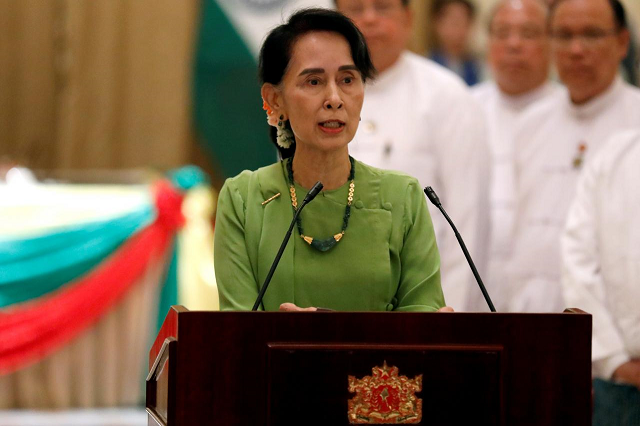"Hate narratives" from abroad drive Myanmar communities apart, Suu Kyi says
Since August, nearly 700,000 Rohingya Muslims from mainly Buddhist Myanmar's Rakhine state have fled to Bangladesh

Myanmaar State Counsellor, Aung San Suu Kuri. PHOTO: REUTERS.
Patience and time are required to restore trust between the communities, Suu Kyi told Christine Schraner Burgener, the United Nations special envoy on Myanmar on Wednesday, according to the statement on the Nobel Peace laureate's Facebook page.
Rohingya Muslim couple falls in love at the world's largest refugee camp
Since August, nearly 700,000 Rohingya Muslims from mainly Buddhist Myanmar's northern Rakhine state have fled to Bangladesh following a military response to Rohingya insurgent attacks, the United Nations and aid agencies have said.
Many reported killings, rape and arson on a large scale. The United Nations has called the campaign a textbook example of "ethnic cleansing", a charge Myanmar denies.
"The state counsellor also pointed out that the hate narratives from outside the country have driven the two communities further apart," the Facebook statement paraphrased Suu Kyi as saying, without identifying the communities. Suu Kyi also stressed the need for a forward-looking approach to resolve the issue, it added.
Zaw Htay, a spokesperson for the government, did not immediately respond to Reuters' requests to clarify what narratives Suu Kyi was referring to.
7 Myanmar soldiers sentenced to 10 years over Rohingya killings
In Facebook and Twitter posts since August, Suu Kyi's government has shown support for non-Muslims displaced by the violence and blamed the international community for distributing "fake news" about alleged rights abuses. Rohingya in Myanmar are denied citizenship, freedom of movement and access to services such as health care and education.
This month, Myanmar and UN agencies signed an outline deal on the return of Rohingya refugees, a warming of ties after a low point hit last year when the government suggested some agencies provided food to Rohingya militants.



















COMMENTS
Comments are moderated and generally will be posted if they are on-topic and not abusive.
For more information, please see our Comments FAQ